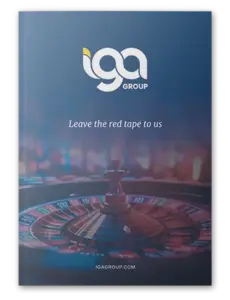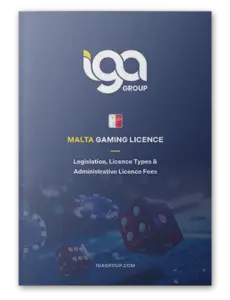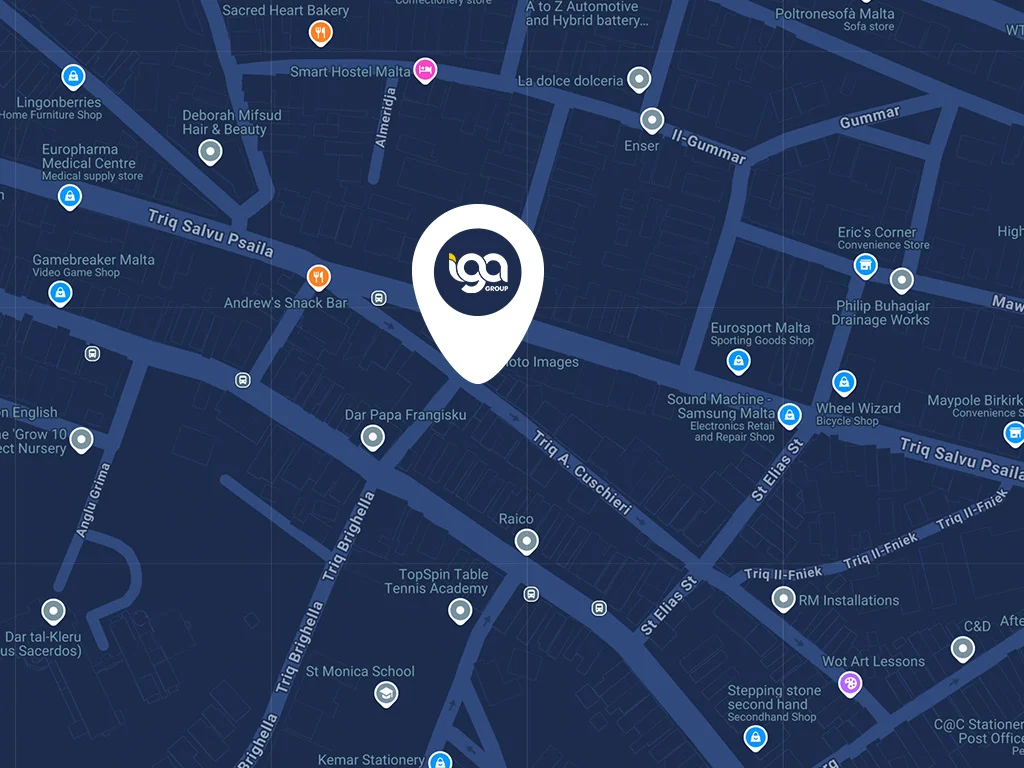Malta
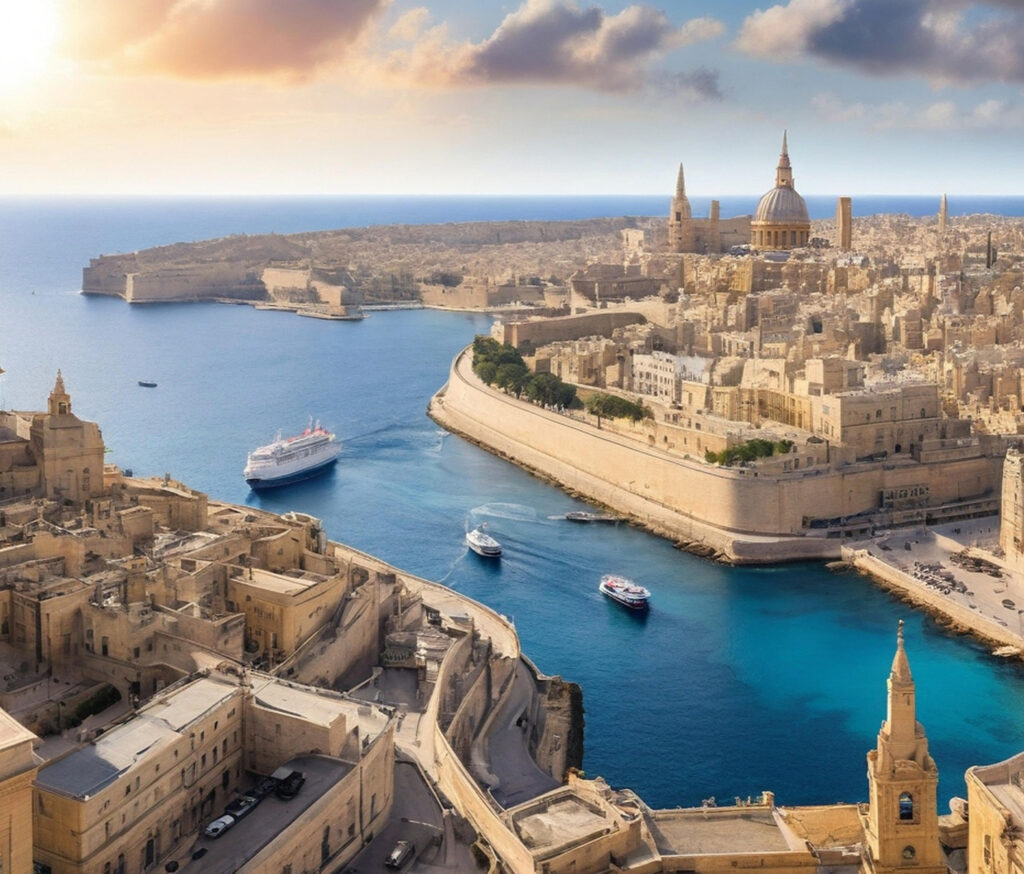
MALTA WAS THE FIRST EU GOVERNMENT TO ENACT COMPREHENSIVE ONLINE GAMBLING LAWS, BECOMING THE INDUSTRY GOLD STANDARD AND A BENCHMARK FOR SUBSEQUENT EUROPEAN GAMING BILLS.
One of the smallest nations in Europe, located south of Sicily in the Mediterranean sea and ruled by the British until 1964, Malta is now independent and a member of the European Union.
Malta has established itself as a leading hub for iGaming operators and one of the most respected and sought-after jurisdictions in the global online gaming industry thanks to its robust regulatory framework, attractive business environment and commitment to player protection.
Discover why Malta remains a top choice for iGaming companies worldwide and how you can leverage our regulatory expertise to build a successful and sustainable online gaming business.
Key Contacts
Downloads
Useful Links
Key Information
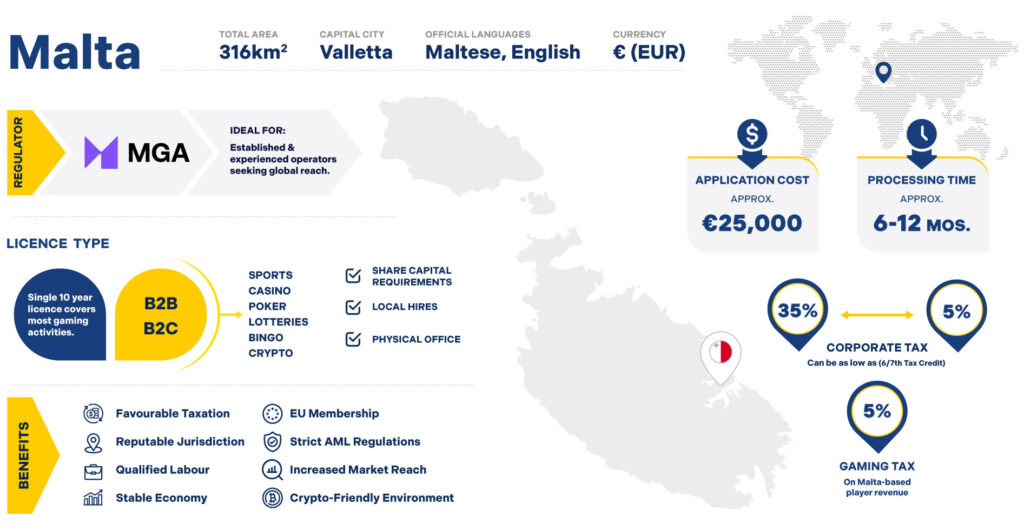
Benefits
OPERATING UNDER THE SUPERVISION OF THE MGA COMES WITH AN ARRAY OF BENEFITS, INCLUDING REGULATORY TRANSPARENCY, A ROBUST BUSINESS INFRASTRUCTURE AND FAVOURABLE TAXATION.
Favourable taxation
Businesses in Malta benefit from exemption under the Value-Added Tax Act and can leverage over 70 double taxation treaties. Highly qualified persons enjoy a flat personal income tax rate of only 15%. Capital gains and dividend income received from subsidiaries of Maltese companies holding at least 10% equity are exempt from tax.
Reputable Jurisdiction
Holding a Malta Gaming License is a testament to an operator’s transparency, fairness and honesty, and contributes to their credibility. The MGA protects players and business owners through regular checks and audits, strict licensing requirements and the suspension of non-compliant licences.
Qualified Labour
Malta has established an excellent telecom and IT infrastructure with outstanding levels of availability and stability. The iGaming industry provides a highly trained and multilingual workforce with expertise in IT, programming, data analytics, marketing and advertising.
Stable Economy
Malta enjoys low unemployment rates, stable and consistent economic growth driven by technology, financial services, manufacturing, tourism and services. Malta’s economic stability is further supported by its EU membership and currency.
EU Membership
Malta follows EU legislation on gaming, setting standards that influence other jurisdictions. The MGA’s checks and regulations align with EU law, providing reassurance to operators, players and third parties (options for payment providers, merchants and bank accounts).
Strict AML Regulations
The MGA also conducts regular inspections and collaborates with the Financial Intelligence Analysis Unit to prevent money laundering in companies holding a Malta Gaming License. Malta strictly adheres to the EU legal framework on anti-money laundering, participating in initiatives by MONEYVAL and FATF.
Increased Market Reach
A Malta Gaming License can be used internationally, except in jurisdictions blacklisted by FATF or those requiring a local licence. Malta’s EU membership ensures the licence’s recognition within the EU, providing companies with access to both EU and international markets.
Crypto-Friendly Environment
Malta’s enactment of laws related to blockchain and other fintech services as well as the country’s commitment to embracing cryptocurrencies and innovative financial technologies further enhances its appeal for operators seeking a progressive and crypto-friendly regulatory environment.
Requirements
During the pre-application process, the malta gaming authority will evaluate all documents and information and decide whether the application can continue. THE AUTHORITY WILL
SEEK TO ESTABLISH WHETHER THE APPLICANT IS PREPARED AND ABLE TO CONDUCT ONLINE GAMING ACTIVITIES IN LINE WITH REQUIRED STANDARDS AND EXPECTATIONS.

01
Legal Entity
Licence-holders must be legal persons established in the EU or the EEA and must establish a physical presence in Malta with a registered office in the country. The entity must have at least one director and a company secretary.
02
Due Diligence
Key positions within the entity will be identified and a thorough ‘fit and proper’ assessment will be undertaken, including probity assessments with other national and international regulatory bodies and enforcement agencies.
03
Financial analysis
The Maltese Gaming Authority will conduct a comprehensive business plan evaluation to ensure the financial viability of the project.
04
Operational & Statutory Requirements
The MGA will review incorporation documents, games, business processes, rules, terms, conditions, policies, procedures and all other technical documentation associated with the gaming and control system.
05
System audit
Licensees must undergo an external system review and compliance audit in a controlled technical environment to audit the live environment against the proposed details in the business plan and application. If significant differences are found, the entire application process will need to be repeated.
06
Compliance review
After going live, licensees must undergo independent third-party compliance reviews of their operations within the first year and as determined by the MGA compliance plan thereafter. Failure of a review may result in the suspension or termination of the licence.
07
Technical Infrastructure
Whereas remote gaming operators may have their gaming equipment and servers located anywhere in the EU/EEA, a forensic live copy of the players’ database, financial transactions database and gaming transactions log database need to be located in Malta.
08
Reporting
A number of key reports are required to monitor overall gaming activity. They include Audited Financial Statements, Interim Financial Statements and Industry Performance Returns (IPRs). Monthly Reports, including Gaming Tax and Player Funds reports are required and subject to regular audits.
09
AML/CFT
Licensees providing Type 1, 2 and 3 games are required to comply with AML & CFT directives via the appointment of AML Officer, the development of internal procedures and policies and the implementation of customer-due-diligence (CDD) and know-your-customer (KYC) procedures.
Capital requirements
Minimum issued and paid-up share capital requirements:
Gaming Service Licence (B2C): Type 1: Minimum €100,000; Type 2: Minimum €100,000; Type 3: Minimum €40,000: Type 4: Minimum €40,000.
Critical Gaming Supply Licence (B2B): Minimum €40,000.
In the case of multiple type approvals, the cumulative share capital adheres to the above requirements and is capped at €240,000.
10
Responsible Gaming
The overriding objectives are to promote responsible gambling, prevent the occurrence of problematic gambling and to safeguard players’ rights. It is imperative that Licensees operate in a manner which is transparent and that they implement preventive measures to mitigate the occurrence of gambling-related harm.
11
Links and Signage
Mandatory on-site display of licensee details, signage forbidding underage gaming, a ‘responsible gaming’ messaging, information about the available player support measures, a dynamic seal or kite mark and links to responsible gaming information and to gambling help organisations. Players must be provided with access to available responsible gaming tools and limits before deposit.
Our Team in Malta
Founded in 2017, IGA Group is a consultancy firm based in Malta specialising in the iGaming industry.
Faithful to our one-stop-gaming shop ethos, our team in Malta provides flexible business solutions and commercial services addressing the full spectrum of operator requirements.
We assist a vast portfolio of companies with their regulatory compliance, licensing and strategic advisory, helping both gaming operators and suppliers navigate complex legal landscapes.
The IGA team includes experts in gaming law, compliance and operations who are dedicated to the optimisation of businesses seeking to operate in ever-harsher regulated environments whilst fully meeting regulatory demands.
The office
Meet Wen
Contact us
The office
Choose a home for your business in our fully-equipped Hub!
Conveniently located in Birkirkara, IGA Hub features modern amenities and versatile office spaces available for rent.
Our spaces are fully equipped with video conferencing facilities, high-speed wi-fi internet as well as photocopying and scanning tools. Designed to foster collaboration and innovation, IGA Hub offers a professional environment for businesses seeking to establish a footprint in Malta.
Drop by during office hours and to discuss the future of your business!

Meet Wen
Ask Wen about your licensing and compliance needs!
Wen is a Senior Licensing Officer based in Malta.
Wen speaks fluent Mandarin as well as English and can assist in different areas related to licensing and compliance.
“My ultimate goal is to go above and beyond for our clients, ensuring that we provide exceptional service that not only meets but exceeds their expectations. By doing so, we can establish a lasting and mutually beneficial relationship.”

Wen Hsieh
SENIOR LICENSING OFFICER
Contact us
Are you ready to launch your business?
Our aim is to make your journey as smooth as possible!
Contact us via [email protected] or +356 27050699 / +356 99441881 to schedule a meeting and discuss how we can support your business needs.
Visit us at our Birkirkara office for a consultation or contact us to schedule a meeting and discuss how we can support your business needs.
Frequently Asked Questions
What is the application timeframe for a Remote Gaming License?
The application timeframe is estimated at 6-12 months and depends on the applicant’s ability to promptly furnish the MGA with required information. Incomplete applications are set to ‘incomplete’ status for 60 days. If a complete application isn’t re-submitted within this period, the authority rejects and closes down the application. After obtaining their licence, licensees have a 60-day period to commence operations. Regardless of the start date, licence fees, compliance contributions and Gaming Tax are due from the licence issuance date.
What is the licence term?
The duration of a gambling licence is indefinite as long as licence holders comply with MGA regulations within the stipulated scope. There are no validity restrictions on the licence, however, all licence holders are obligated to pay a fixed, non-refundable annual licence fee in advance for the 12 running months from the issuance of the licence and every anniversary thereafter.
Can gambling companies in Malta be owned by non-residents?
Non-residents are allowed to own a gambling company in Malta, with no limitations imposed on the nationality or residency of the company’s owners. One of the most common legal structures for gambling businesses in Malta is a Private Limited Liability Company (Ltd) with 1-50 shareholders, all of which can be non-residents.
Are there any residency requirements for company Directors?
A Malta-based gambling company is permitted to have directors who are not local residents, provided that a number of requirements and obligations are met by the company and its directors to comply with the regulations set by the MGA.
What are the authorised capital requirements?
Information on the capital requirements may be found in the ‘Requirements’ section above.
What taxes must a licensee pay?
Entities holding a gambling licence in Malta are subject to various taxes and fees, including a Corporate Income Tax imposed on the company’s profits, a Gaming Tax levied on gaming revenue generated within Malta, a Value Added Tax (VAT) applicable based on standard VAT rules in addition to various fees, administrative charges and social contributions.
Which countries are restricted to licensees?
With an MGA licence an operator can target all regulated markets, provided that online gambling is legal and not subject to local licensing requirements in those jurisdictions and unless the country is blacklisted or greylisted. There are a number of caveats to this rule though, so it is important to stay up-to-date with the evolving regulations.
What is most important for international operations is that if a company based in a country inside the European Union has a gambling licence, its services can be offered throughout the EU – leveraging the potential market of over half a billion people. This is legally framed by the EU Freedom of Establishment law and supported by judgments of the European Court of Justice (European Court of Justice ruling of 9th September 2010 – C316/07).
What are key functions?
By definition, the term “key function” means an important function, role or task carried out by a person in connection with a gaming service or a gaming supply, as may be prescribed by the Gaming Authorisations and Compliance Directive (Directive 3 of 2018).
Key Persons are required to have full knowledge, understanding and access to the applicant’s or licensee’s operations, as may be necessary for them to carry out their respective Key Function/s.
Applicants are required to be fit and proper in order to carry out their respective roles, not only at the time of their application for a Key Function Certificate, but also on an ongoing basis thereafter.
Any changes in the individual responsible for any of the Key Functions must be notified to the MGA, and the new individual appointed must likewise be approved by the MGA.
What are the essential components of a licensee operation?
Essential components for the setup of a licensee’s operation include those hosting Random Number Generators, jackpots, games, gaming database, player database, financial database, control systems and any other component deemed critical by the Authority.
Where can I find the regulatory framework?
The applicable regulations and directives may be found here.
Need assistance?
Whether you have queries, need further assistance or would like to request a quote for any of our services, please don’t hesitate to contact us.
Leave your phone number and we’ll make sure to call you back.



